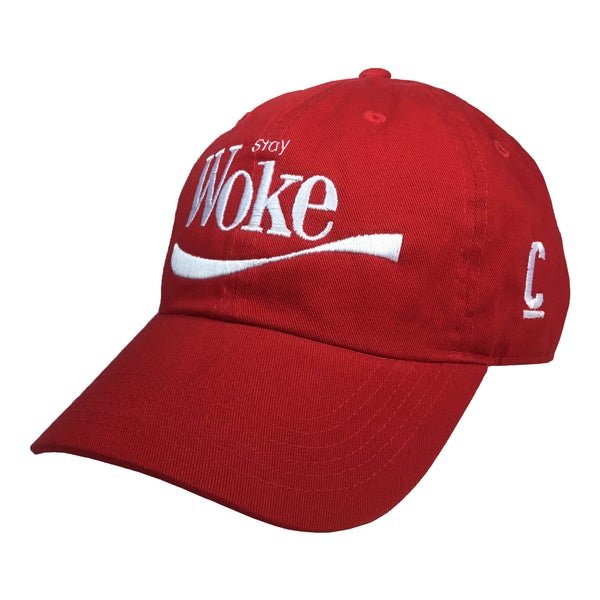"Woke"
A couple of days ago, North Carolina Republican Madison Cawthorn, the youngest philistine in Congress, held a town hall forum in his home state. Speaking to the group - many of whom are not supporting him for reelection - he called Ukrainian President Zelinskyy (the correct transliteration of his name) a "thug," and posited that the Ukrainian government, now under siege by the Russian military, is "incredibly corrupt, and incredibly evil, and has been pushing woke ideologies." Someone should have informed the 26-year old man child that the word woke, when used in its relatively modern political incarnation is decidedly not plural. Simply stated, there are no woke ideologies. Had I been at the gathering I would have fought through the increasing nausea to inform him of his misstatement and then ask him a simple question: “Would you please define the term woke (or stay woke) in its political context for all of us?” Not having been there (thank G-d!), I can only imagine the utter jabberwalky with which my inquiry no doubt would have been met. By and large, I have rarely met a Trumpeter who has the slightest idea of what the word woke means. When coming from the mouth of a moron, it is intended to be a derisive political aspersion; a synonymous look-down-the-nose slur . . . a middle-finger-in-the-air epithet for politically correct, progressive or liberal.
A little research turns up the fact that the term woke or the two-word phrase stay woke goes back nearly 85 years when blues musician Huddle Ledbetter (better known as “Lead Belly - the King of the 12-String Guitar”) used it in a 1938 protest song entitled Scottsboro Boys. In the song, Ledbetter tells a story about nine black teenagers who were falsely accused of raping two white women on a train in Scottsboro, Alabama, in 1931. Ledbetter warns black people that they “. . . best stay woke, keep their eyes open", when travelling through Alabama. In addition to the Scottsboro Boys, he also wrote songs about people in the news, such as FDR, Adolf Hitler, Jean Harlow, boxer Jack Johnson and, believe it or not, Howard Hughes.
Three decades later in 1962, African American novelist William Melvin Kelley (1937-2017) wrote an article in the New York Times titled If You're Woke, You Dig It, in which he describes a 'woke' person as someone who's aware of the experiences of black people in the United States. The term gained popularity on social media in 2014 following the killing of Michael Brown, an 18-year-old who was fatally shot by a white police officer named Darren Wilson in Ferguson, Missouri. After prosecutors said that they did not have enough evidence to bring charges of murder or manslaughter against the officer, protests took place nationwide, with the slogan "stay woke" being used to shed light on instances of police brutality against Black people.
While it originally meant “becoming woken up or sensitised to issues of justice”, its meaning has changed over time into a political slur, according to linguist Tony Thorne.
The labels 'woke warrior', 'wokerati' (a British term) and 'woke worthies' are often used to insult people on the left, who are seen by conservatives as a threat to freedom of speech. A year ago, British P.M. Boris Johnson's spokesman said he was not sure what the word "woke" meant, despite the government having declared war on "woke worthies" and introducing a law to stop them. Then too, when leaving office in January 2021, former secretary of state Mike Pompeo tweeted: "Censorship, wokeness, political correctness, it all points on one direction — authoritarianism, cloaked as moral righteousness."
Secretary Pompeo’s statement is – as Granny Annie would have it “utter canal water.”
What this brief historico-entymological journey through the land of woke teaches us is a couple of intriguing factoids:
That woke and its linguistic derivatives have a longer history than one might suspect;
That its meaning changes over time, and that these changes are, generally speaking, due to changes in political action and vocabulary.
That this single one-syllable word has so many meanings - especially today - as to be almost devoid of meaning itself.
New York Representative Alexandria Ocasio-Cortez (AOC), herself an avatar of wokeness, tweeted not too long ago that ‘Woke’ is a term pundits are now using as a derogatory euphemism for civil rights & justice.” As one of the most visible members of her generation (who grew up in the ‘90s, she insists - unlike progressives who grew up in the ‘60s through the ‘80s - that “Woke ain’t broke.” Where once woke meant to keep one’s eyes and ears attuned to social and political injustice, today’s up-and-comers believe it is far, far more. That being woke is senseless if it does not motivate liberals and progressives to action; to the understanding that words aren’t nearly as important as sweat they can produce.
The next time you hear or read the word woke coming out of the mouth, pen or keyboard of a political Luddite, you might demand for them to define the term . . . and prepare yourself for the sound of silence.
Copyright©2020 Kurt F. Stone


